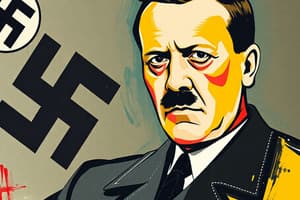Podcast
Questions and Answers
What event in 1934 marked a turning point in Hitler's regime by asserting his authority and eliminating potential rivals?
What event in 1934 marked a turning point in Hitler's regime by asserting his authority and eliminating potential rivals?
- The Reichstag Fire
- The Beer Hall Putsch
- The Enabling Act
- The Night of the Long Knives (correct)
Which factor played a significant role in Hitler's rise to power by exploiting German anxieties?
Which factor played a significant role in Hitler's rise to power by exploiting German anxieties?
- The promotion of nationalism and German pride
- The manipulation of the media
- The failures of the Weimar Republic (correct)
- The use of artwork
Which legislative act effectively gave Hitler dictatorial powers and allowed him to establish a dictatorship in Germany?
Which legislative act effectively gave Hitler dictatorial powers and allowed him to establish a dictatorship in Germany?
- The Reichstag Fire Decree
- The Beer Hall Putsch
- The Enabling Act (correct)
- The Nuremberg Laws
What were some of the shortcomings of the Weimar Republic that contributed to its instability?
What were some of the shortcomings of the Weimar Republic that contributed to its instability?
Which radical political movement emerged due to the weaknesses of the Weimar Republic and the impact of the Great Depression?
Which radical political movement emerged due to the weaknesses of the Weimar Republic and the impact of the Great Depression?
How did Hitler rise to power in 1933?
How did Hitler rise to power in 1933?
Which event solidified Hitler's power and eliminated threats within his own party in 1934?
Which event solidified Hitler's power and eliminated threats within his own party in 1934?
Flashcards are hidden until you start studying
Study Notes
Hitler's Ascent to Power: A Journey Through a Tumultuous Era
In the years following the devastating aftermath of World War I, Germany's fragile democracy known as the Weimar Republic struggled to maintain peace and stability. This fragility would give way to the rise of a man whose name would become synonymous with tyranny and genocide—Adolf Hitler.
The Weimar Republic: A House Built on Sand
The Weimar Republic was established in 1919, initiating an era of political, economic, and social instability. Its shortcomings, such as high inflation, unemployment, and the Treaty of Versailles, created fertile ground for radical political movements to emerge.
The Nazi Party: A Political Firestorm
The Nazi Party, founded in 1920 by Anton Drexler and Adolf Hitler, was a minor fringe group until the devastation wrought by the Great Depression. The party's message of anti-Semitism, nationalism, and aggressive militarism resonated with the German populace, and the Nazi Party's membership swelled.
In 1933, Hitler was appointed Chancellor of Germany, and by 1934, he had established a totalitarian regime. This rise to power was facilitated by the Enabling Act, which granted Hitler the power to enact laws without parliamentary approval.
Propaganda: The Art of Persuasion
The Nazi Party understood the importance of propaganda in shaping public opinion. Joseph Goebbels, Hitler's Minister of Propaganda, employed a variety of techniques to disseminate the party's message. These included the manipulation of the media, the use of artwork, and the promotion of nationalism and German pride.
The Night of the Long Knives: A Turning Point
In 1934, Hitler ordered the assassination of several high-ranking members of the Nazi Party, including Ernst Röhm. This purge, known as the Night of the Long Knives, was an assertion of Hitler's authority and a warning to potential rivals.
Conclusion
Hitler's rise to power was a complex and tumultuous journey that involved the interplay of many factors. The failures of the Weimar Republic, the Nazi Party's exploitation of German anxieties, and the skillful use of propaganda and intimidation all played a part in Hitler's ascent to power. The consequences of this rise would leave an indelible mark on history, leading to the Second World War and the devastation it brought.
Studying That Suits You
Use AI to generate personalized quizzes and flashcards to suit your learning preferences.




